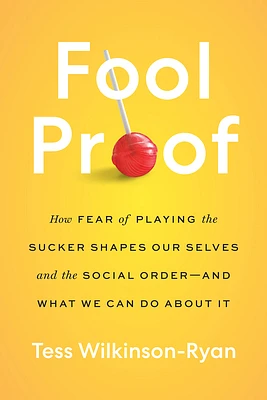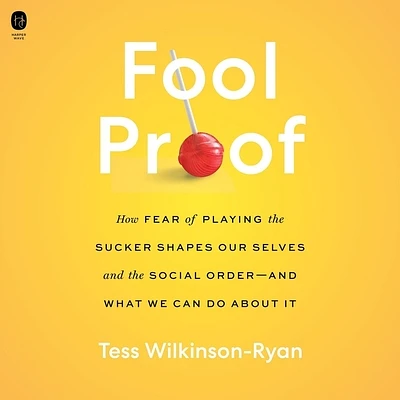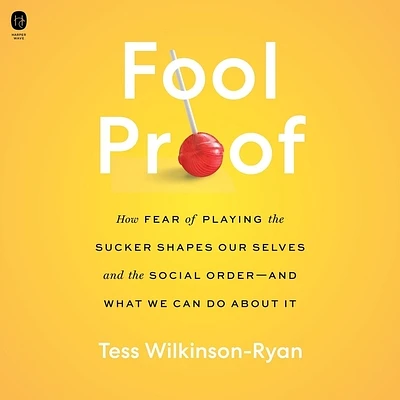Home
Fool Proof: How Fear of Playing the Sucker Shapes Our Selves and Social Order-and What We Can Do About It
Loading Inventory...
Barnes and Noble
Fool Proof: How Fear of Playing the Sucker Shapes Our Selves and Social Order-and What We Can Do About It
Current price: $27.99


Barnes and Noble
Fool Proof: How Fear of Playing the Sucker Shapes Our Selves and Social Order-and What We Can Do About It
Current price: $27.99
Loading Inventory...
Size: Audiobook
*Product Information may vary - to confirm product availability, pricing, and additional information please contact Barnes and Noble
The fear of playing the fool is a universal psychological phenomenon and an underappreciated driver of human behavior; in the spirit of Malcolm Gladwell’s
Blink,
Dan Ariely’s
Predictably Irrational,
and Susan Cain’s
Quiet, Fool Proof
tracks the implications of the sucker construct from personal choices to cultural conflict, ultimately charting an unexpected and empowering path forward.
In the American moral vernacular, we have a whole thesaurus for victims of exploitation. They are suckers (born every minute), fools (not suffered gladly), dupes, marks, chumps, pawns, and losers. Fool me once, shame on you; fool me twice, shame on me. Cultural stories about suckers abound too: the Trojan Horse, the Boy Who Cried Wolf, the Emperor’s New Clothes, even Hansel and Gretel. If you believe that, I have a bridge to sell you. Don’t go out with him; he only wants one thing. The fear of playing the fool is not just a descriptive fact; it is a prescriptive theme:
Don’t let that be you
.
Most of us are constantly navigating two sets of imperatives: how to be successful and how to be good. The fear of being suckered whispers that you can’t do both, operating as a quiet caution against leaps of faith and acts of altruism. University of Pennsylvania law professor and moral psychologist Tess Wilkinson-Ryan brings evidence from studies in psychology, sociology, and economics to show how the sucker construct shapes, and distorts, human decision-making.
Fool Proof
offers the first in-depth analysis of the sucker’s game as implicit worldview, drawing evidence everywhere from grocery shopping to international trade deals, from road rage to #MeToo. Offering real-world puzzles and stories, Wilkinson-Ryan explores what kinds of hustles feel like scams and which ones feel like business as usual, who gets pegged as suckers and who gets lauded as saints. She takes deep dives into areas like the psychology of stereotyping, the history of ethnic slurs, and the economics of the family—and shows how the threat of being suckered is deployed to perpetuate social and economic hierarchies.
Ultimately,
argues that the goal is not so much to spot the con as to renegotiate its meaning. The fear of being suckered can be weaponized to disrupt cooperation and trust, but it can also be defused and reframed to make space for moral agency and social progress. Facing the fear of being suckered head-on means deciding for ourselves what risks to take, what relationships to invest in, when to share, and when to protest—drafting a new template for how to live with integrity in a sucker’s world.
Blink,
Dan Ariely’s
Predictably Irrational,
and Susan Cain’s
Quiet, Fool Proof
tracks the implications of the sucker construct from personal choices to cultural conflict, ultimately charting an unexpected and empowering path forward.
In the American moral vernacular, we have a whole thesaurus for victims of exploitation. They are suckers (born every minute), fools (not suffered gladly), dupes, marks, chumps, pawns, and losers. Fool me once, shame on you; fool me twice, shame on me. Cultural stories about suckers abound too: the Trojan Horse, the Boy Who Cried Wolf, the Emperor’s New Clothes, even Hansel and Gretel. If you believe that, I have a bridge to sell you. Don’t go out with him; he only wants one thing. The fear of playing the fool is not just a descriptive fact; it is a prescriptive theme:
Don’t let that be you
.
Most of us are constantly navigating two sets of imperatives: how to be successful and how to be good. The fear of being suckered whispers that you can’t do both, operating as a quiet caution against leaps of faith and acts of altruism. University of Pennsylvania law professor and moral psychologist Tess Wilkinson-Ryan brings evidence from studies in psychology, sociology, and economics to show how the sucker construct shapes, and distorts, human decision-making.
Fool Proof
offers the first in-depth analysis of the sucker’s game as implicit worldview, drawing evidence everywhere from grocery shopping to international trade deals, from road rage to #MeToo. Offering real-world puzzles and stories, Wilkinson-Ryan explores what kinds of hustles feel like scams and which ones feel like business as usual, who gets pegged as suckers and who gets lauded as saints. She takes deep dives into areas like the psychology of stereotyping, the history of ethnic slurs, and the economics of the family—and shows how the threat of being suckered is deployed to perpetuate social and economic hierarchies.
Ultimately,
argues that the goal is not so much to spot the con as to renegotiate its meaning. The fear of being suckered can be weaponized to disrupt cooperation and trust, but it can also be defused and reframed to make space for moral agency and social progress. Facing the fear of being suckered head-on means deciding for ourselves what risks to take, what relationships to invest in, when to share, and when to protest—drafting a new template for how to live with integrity in a sucker’s world.










